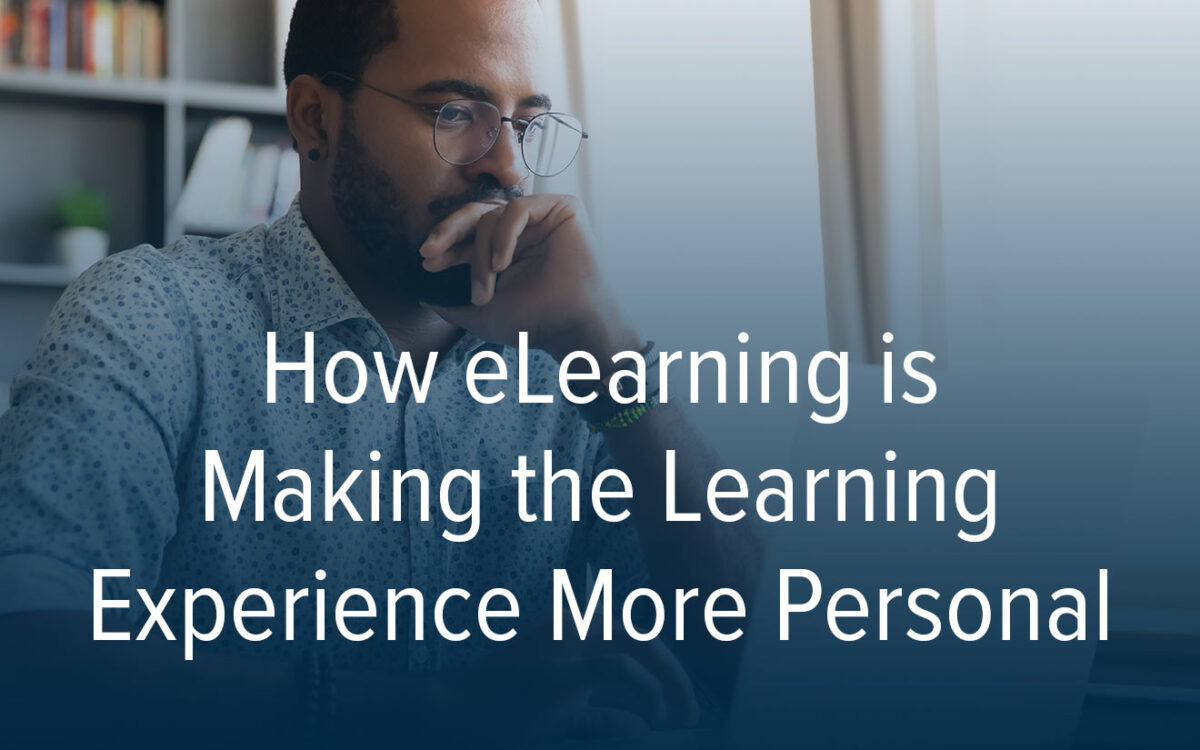
In a post-pandemic world, offering virtual options is now the bare minimum. People expect personalization. Technology has been the go-to solution in the face of pandemic challenges; but, while tech often inherently allows for more flexibility, it’s not always a personalized experience for users. Whether in a virtual, hybrid, or in-person setting, employees are demanding to be seen as more than just a number. Therefore, it is critical to choose tech that understands the nuances of balancing your employees’ needs and organization-wide goals. An eLearning platform that has the capabilities to provide a highly personalized learning experience for employees is the solution.
The importance of personalized learning
“Personalized learning” refers to learning experiences that meet employees where they are. Many experts say it offers an elegant solution to a long-standing dilemma: Learning and development are critical to corporate success, but if leaders aren’t careful, training can quickly swallow big chunks of employees’ time and a company’s budget. One-size-fits-all never works, and as it turns out, it is an expensive waste of time for employees and the organization. That’s where personalized learning makes a difference.
At Amplifire, we see the impact of personalized learning through our training results. Our platform guides employees to proficiency in less time at less cost. Take electronic health record (EHR) training, for example. EHR installations can cost billions. At UCHealth, a national center for EHR training, classroom instruction has been fully replaced with Amplifire. The result was a 56% reduction in training time and an estimated $1.45 million in cost savings. These consequential organizational results aside, UCHealth’s providers returned to the floor with the confidence to do their job to the best of their ability because their training targeted exactly what they needed to know and didn’t waste time reteaching what they already knew.
Personalized, “learner-centric” training can be applied in corporate training settings with the same results: a >50% reduction in training time is common across the board. It is possible to achieve strong results consistently because learner-centric training puts the learner back at the center of the learning process — they are active agents in their learning. To truly offer an effective personalized learning experience, your training platform must be learner centric.
3 Must-haves to personalize the online learning experience
It may seem contradictory to claim that online learning could be more personal than literal in-person instruction. But as a company whose job is to ensure learning is effective and long-lasting, a personalized, learner-centric approach is at the heart of Amplifire’s eLearning platform. We rely on features that not only make the online learning experience better but have also proven to be more effective than traditional teaching and training methods. Here are some examples of what personalized learning looks like in a training platform:
1. Adaptive platform
An adaptive platform that adjusts to individual learners’ knowledge levels is essential to learning personalization. It tailors the experience to learners’ needs, filling in knowledge gaps, shoring up uncertainties, and correcting misconceptions. By adapting to their knowledge level, trainees don’t waste time relearning things they already know. Instead, they spend more time only on subjects they demonstrate struggle with. The platform then provides feedback to support active learning that sticks. Furthermore, trainees receive real-time guidance from Amplifire’s virtual coach. The coach encourages and cajoles trainees to keep up the good work, improve their pace, or to keep focused when they get off track.
Amplifire’s adaptive platform is uniquely learner-centric because it allows trainees to indicate whether they don’t know an answer, are unsure about the answer they’re providing, or if they are answering confidently. This feature represents a particularly effective brain science technique that allows the platform to identify areas of weakness and adjust accordingly. We’ll explain this personalized aspect in a bit more depth…
2. Brain science-based techniques
A common assumption about online learning is that platforms tend to neglect the humanity of the learner on the other side of the screen. However, our platform harnesses the brain’s natural learning mechanisms, which are innately personalized to the human experience. Combined with our adaptive algorithm that guides each learner, the cognitive science principles built into the platform provide yet another level of personalization.
Amplifire is built on 23 cognitive triggers that are proven to make learning stick. One such trigger is meta-cognition which is built into the answering format we previously described. When learners think about how well they do or do not know something, it forces extra attention to strengthen or fill in any knowledge gaps, thus, better learning! What’s more personal than a platform that values how a trainee thinks and feels while they learn.
Another trigger is feedback. Research indicates that a slight delay in feedback is optimal for better learning. So, when a learner gives an answer, feedback is adjusted to whether they answer incorrectly, correctly, or hesitantly, and is given with a slight delay. This is experience is tailored to individuals and is not one-size-fits-all feedback.
These are just two examples of nearly two-dozen triggers embedded in the Amplifire platform to enhance the learning process on a personal level.
3. Analytics
Robust analytics collected on an individual basis provide an outlook on a learner’s starting point and progress, down to the exact instances of misconceptions, uncertainties, and gaps up to the degree of mastery.
But analytics aren’t only for back-end use — they can help learners inform their own progress, too. If learners are preparing for certification exams, tests, or simply gauging their knowledge on a particular topic, self-assessment pre-tests are a great way to identify where to focus time and effort. These pre-tests also act as a priming mechanism — another powerful cognitive trigger to make learning stick.
Learners can also access their personal dashboard, which is constructed on the fly during learning. The dashboard gives each learner insight into their pathway to mastery.
Online training doesn’t have to be cold, impersonal, and boring. In fact, when built right, it can be extremely engaging, highly personalized, and uniquely effective.
From the beginning, Amplifire has relied on innovative brain science to guide its product development to create the most effective learning and training solution, perfectly tailored to the way the human brain works. Learn more about how Amplifire helps people learn better and faster by checking out a demo.







